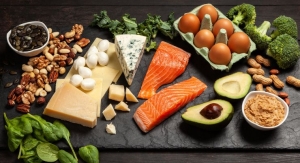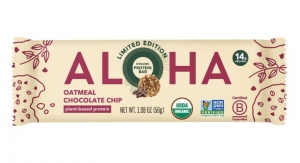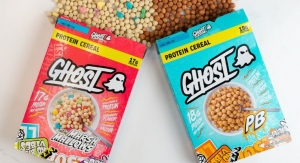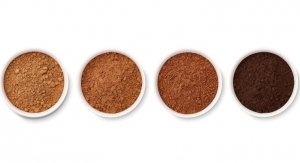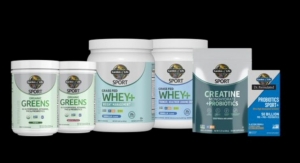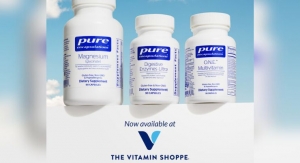By Sean Moloughney, Editor04.02.18
Protein has become a darling macronutrient among all types of consumers, including athletes looking for a competitive edge, aging seniors intent on maintaining muscle mass, and busy parents who are opting for meal-replacement bars and shakes.
Specialty diet trends like paleo, ketogenic, and Whole30, which emphasize fat and protein over carbohydrates and sugar, have compelled more people to assess their protein intake and seek out new sources.
Meanwhile, commitments to active living and healthy aging are driving the protein market in fresh directions. As consumers from various backgrounds—with different health goals, lifestyles, and values—continue to add more protein to their diet, companies have formulated innovative dietary supplements and other functional nutrition products to satisfy burgeoning demand.
“The consumer protein landscape continues to diversify, broadening its reach from outside elite athletes and bodybuilders to include more active individuals, who are looking to protein-rich products to supply them with energy to go about their day-to-day lives,” said Mallory Junggren, senior marketing director, Nutrition 21 LLC, Purchase, NY.
Documented health benefits of protein have resonated with consumers, including increased muscle mass and strength, energy, reduced hunger, and help with weight loss. “Protein’s importance, specifically regarding its effect on muscle development, metabolism, and energy, is increasing its popularity among the general population,” said Ms. Junggren.
Consumers are also more aware about the ability of protein to slow the effects of sarcopenia, the loss of muscle mass, strength, and function related to aging, she added. “Hormonal shifts, a decline in activity, diet changes, etc. can all impact muscle loss as we age. By consuming the right amount of protein and staying active, the effects of sarcopenia could potentially be curbed, or at the very least, lessened.”
Consumers are more informed than ever and are taking a proactive approach to wellness, noted Heather Arment, marketing coordinator, North America, Gelita, Sergeant Bluff, IA. “They strive to optimize health and mobility, at any and every age, and they also recognize that what they do today affects their quality of life today and tomorrow. This has created new opportunities for beverage and food manufacturers to help consumers achieve their goals.”
Focus on fit and active lifestyles has fueled consumption of protein supplements in the U.S., according to Jayesh Chaudhari, MS, CNS, senior director, R&D, Prinova Solutions, Carol Stream, IL. “In recent years, consumers—irrespective of culture and age group—are primarily looking for quality foods—minimally processed and densely packed with nutrients and optimal calorie content. A clean label, in addition to added regulatory requirements such as organic, non-GMO, gluten- and allergen-free, natural, and low-contaminants are key elements determining the buying behavior of the attentive consumer.”
In addition to sensory attributes (taste and texture), well-informed consumers look for specific health benefits from a protein source as they make a purchase decision, such as energy balance, weight loss, muscle repair, satiety, and digestibility, he added. “Nonetheless, the ease of convenience of the product is one of the main governing factors determining their purchase decision.”
Market Momentum
The global protein supplement market was valued at $12.4 billion in 2016 and is expected to grow at a CAGR of 6.3% from 2017 to 2025, according to a 2017 report from Grand View Research. The market is expected to show significant expansion over the forecast period as more consumers connect protein with maintaining a healthy diet and leading an active lifestyle.
Innovation in the manufacturing of proteins that contain a broad range of amino acids targeting specific functions—including energy balance, weight loss, muscle repair, and satiety—is expected to promote growth as well.
Concerns about allergens and growing popularity of specialty diets are influencing the protein market overall, according to Stephanie Lynch, vice president of sales, marketing, and technology, International Dehydrated Foods (IDF), Springfield, MO. “While soy and whey have been mainstays in the supplement market, the fact is, many people are allergic to these (and other) common sources of protein. Dairy, wheat, and soy are present on the list of eight major food allergens, and 65% of the human population has a reduced ability to digest lactose after infancy. Furthermore, specialty diets, such as keto, paleo, and gluten-free are trending, so an increasing number of people are cutting common sources of protein from their diets.”
Convenience is a major selling point for consumers when they buy protein-based supplements and fortified foods, according to Samantha Ford, business development director, AIDP, City of Industry, CA. “Athletes, professionals, students, and parents on the go—many people do not have time to sit down and eat their ‘three squares’ as was typical a few decades ago.”
Consumers are looking for beverages and foods to deliver more than just satiety (fuel) and enjoyment, said Ms. Arment. “Modern consumers are looking to maximize health benefits through good nutrition and supplementation. To meet the demand of different target groups, product concepts need to deliver real benefits. However, today’s consumers expect these benefits without having to sacrifice the smell or taste of the product.”
People want products that first and foremost taste good and have a good mouth-feel, added Ms. Ford. “In addition, they want products that successfully curb their hunger and keep them energized between meals. Plant proteins are a booming segment as people are turning to more plant-based diets for perceived health value. They want products that will provide a complete and well-rounded amino acid profile to suit their needs, without an excess of sugars or artificial ingredients.”
Clean Controversy
A recent report on protein powder supplements published by the Clean Label Project, a non-profit which says it’s focused on health and transparency in labeling, claimed that many protein powder supplements contain heavy metals and BPA. While the report has not been published, the group said the study is in the process of being peer reviewed.
The report evaluated 134 protein powder products from 52 brands, which were screened for over 130 toxins including heavy metals, BPA, pesticides, and other contaminants. The top-selling protein powder products as determined by Nielsen data and Amazon.com’s best-seller list were tested and reviewed by a third-party analytical chemistry laboratory for industrial and environmental contaminants and nutritional superiority elements.
Products were tested for heavy metals (arsenic, cadmium, lead, and mercury), over 100 pesticides, BPA/BPS (plasticizers that are known endocrine disruptors), residual solvents, mycotoxins, melamine and its analogues, and antibiotic residues. Study results on Clean Label Project’s website were presented in a 5-star rating system.
According to Clean Label Project, testing found high levels of lead, BPA, mercury, cadmium, and arsenic—substances which have been linked to cancer, reproductive harm, and brain damage. The worst offenders were plant-based protein powders. Lab testing allegedly revealed that approximately 75% had “measurable levels of lead.” The laboratory discovered that plant-based protein powders contained on average twice the amount of lead per serving of other products. In addition to lead, the plant-based protein powders contained mercury, cadmium and arsenic, in several cases above health-based guidelines, according to Clean Label Project. Additionally, 55% of protein powders tested had measurable levels of BPA.
“Plant-based protein powders have higher levels of heavy metals than non-plant-based protein powders,” said Sean Callan, PhD, director of operations and quality at Ellipse Analytics, the third-party analytical chemistry laboratory that performed the testing. “This could be due to the locations where the protein powder manufacturers’ plant ingredients are sourced having contaminated soil. This is especially true in the United States where there may be a higher incidence of heavy metals in the soil of some regions.”
Testing also allegedly revealed that about 10% of whey-based protein powders contained lead levels above health guidelines. However, none of the egg-based protein powders contained lead. The study also reportedly found that 28 out of 134 of the protein powders contained twice the regulatory limit (3 mcg) of BPA; one product had 79.9 mcg of BPA in one serving.
Andrea Wong, PhD, vice president, scientific & regulatory affairs at the Council for Responsible Nutrition (CRN), said dietary supplement and functional food companies are always looking for ways to improve their products and exceed consumer expectations for quality and transparency, “so this study by the Clean Label Project deserves careful scrutiny as an opportunity to improve. The fact that this study allegedly detected contaminants in higher-than-acceptable levels is concerning to CRN, but, with the limited information that was disclosed, we are unable to decipher the facts. CRN has some reservations about the conclusions and data analysis that should also be considered.”
For example, a detectable level of a contaminant is not necessarily an unsafe level, she noted; it simply means that instrumentation is sophisticated enough to detect it. “It is not surprising that plant-based protein sources may have detectable levels of certain naturally occurring compounds as plants naturally absorb minerals from the soil in which they grow,” she said. “All dietary supplements are required to meet quality standards, and those that do not meet requirements established by Good Manufacturing Practices are subject to enforcement action by FDA.”
“In the interest of its mission of increased transparency, the Clean Label Project should provide insight into how its product rating system is quantified,” Dr. Wong continued. “Its star rating system appears to be subjective and fails to give consumers the information to make informed purchasing decisions.”
Preference for Plants
Despite the Clean Label Project’s controversial report, plant sources of protein supplements and other functional products are in high demand. Plant proteins are often seen as sustainable and good for the planet because they are less resource-intensive than animal proteins.
Once a staple in American refrigerators, traditional dairy milk has been on the decline. The dairy alternatives market was valued at nearly $8 billion in 2016, according to MarketsandMarkets Research. Soy, almond, and rice milks have been the leaders, but have some limitations. For instance, soy beans are often genetically modified; almond milk typically has less protein than dairy milk and requires significant amounts of water to produce; and rice milk is also typically low in protein.
Yellow peas have become the latest alternative milk source to gain mainstream attention. For example, Ripple Foods—founded by Adam Lowry and Neil Renninger, scientists who previously founded Method cleaning products and Amyris Biotechnologies, respectively—offers a line of pea-based milks that contain 8 grams of protein from the company’s proprietary Ripptein pea protein, and 32 mg of omega-3 DHA from algal oil per serving.
Other companies have followed suit. Whitewave’s Silk brand introduced a Protein Nutmilk that boasts 10 grams of pea protein blended with almonds, and cashews. And Campbell Soup Company’s Bolthouse Farms offers a plant milk with 10 grams of pea protein.
Ultimately, whether it’s for alternative milks, dietary supplements, nutrition bars, or other fortified products, taste remains a primary selling point. In fact, new research from Mintel indicated that taste is the top reason why U.S. adults eat plant-based proteins (52%). Of a survey of 1,876 U.S. Internet users aged 18+ who eat plant-based proteins, taste outranked concerns over diet (specifically, eating vegetarian), (10%), animal protection (11%), the environment (13%), and even health (39%).
While taste tops the list of reasons to eat plant-based proteins, perceived health benefits are on consumers’ minds, as nearly half (46%) of Americans agreed that plant-based proteins are better for you than animal-based options, and three quarters (76%) said plant-based foods are healthy. Whether a desire to avoid processed foods (39%), manage weight (31%) or promote muscle growth (16%), many plant-based protein consumers are motivated by maintaining or improving their health and well-being.
When it comes to making decisions in the grocery aisle, again, taste (65%) is the driving factor for those who eat plant-based proteins, followed by health-centric attributes. These consumers are more likely to seek plant-based protein products with no artificial ingredients (41%), that are high in protein (35%) and fiber (28%), and those that are non-GMO (28%).
“While overall consumption of plant-based proteins remains low, these products benefit from a generally healthy reputation both for consumers’ diets and for the environment, and growing consumer interest in better-for-you lifestyles will continue to drive interest in the category,” said Billy Roberts, senior food and drink analyst at Mintel.
While healthy and functional attributes are of interest to consumers, less than half (46%) of Americans said they trust functional claims made by plant-based foods. In fact, seven in 10 (71%) Americans agreed that brands should provide more information about product/ingredient origin on packaging.
While consumers are most likely to say they eat plant-based proteins in prepared meals (66%), traditionally animal-based products, such as meat (51%), cheese (45%), and milk (41%), are also popular options. This is especially true for consumers aged 18-34, as they are the most likely age group to eat plant-based proteins in meat (58%), cheese (56%), and milk (53%).
Despite this interest, it seems price may be a deterrent. Nearly two thirds (64%) of Americans aged 18-34 agreed that plant-based foods are more expensive than others, compared to 57% of consumers overall. However, some brands may be worth the price, as almost half (47%) of those aged 18-34 said brand name is important when buying plant-based foods, compared to 40% of consumers overall.
“Faux meat has come a long way in terms of both innovation and consumer acceptance, with meatless, ‘bleeding’ burgers and lab-grown chicken found on menus and in grocery store aisles across the country,” added Mr. Roberts. “The majority of consumers look for plant-based proteins in meat, cheese, and milk, which suggests that alternative meats and dairy products will find appeal, resulting in increased consumption. Additionally, a value-oriented plant-based protein may resonate well with members of the iGeneration, millennials, and younger members of generation X, as these consumers are more likely to say plant-based proteins are too expensive. Thus, major brands’ involvement in the category could bode well for the category as a whole.”
While interest in plant-based proteins is on the rise, animal-based meat is here to stay. More than two thirds (67%) of Americans agreed that meat is essential to a balanced diet, and just over half (51%) believe a meal is not complete without meat, according to Mintel.
“The opportunity for plant-based proteins appears more as a complement to animal-based proteins than as a wholesale replacement, as our research shows that many consumers are interested in plant-based proteins but still view meat as an important part of a balanced diet. The biggest challenge for the plant-based proteins category continues to be finding the right balance between flavor and health and discovering the categories where consumers will accept the addition of plant-based varieties,” concluded Mr. Roberts.
Innovation Abounds
While many consumers are spurring growth in plant proteins, the meat snack and bone broth markets continue to attract a loyal following of carnivores.
For example, the EPIC brand, acquired by General Mills in 2016, markets bars, bits, and strips derived from beef, venison, wild boar, lamb, bison, chicken, turkey, and salmon. The company also offers bone broth and cooking oils as part of the brand’s “nose-to-tail” commitment to “honoring and utilizing all aspects of the animal.”
“It’s interesting to see that consumers are now incorporating different types of protein into their diets,” said Ms. Junggren of Nutrition 21. “Pea and vegetable proteins, along with whey and BCAA products all assist in muscle growth and strength, and consumers are now looking to these options that will fit in their diets (e.g., paleo, vegan, vegetarian, etc.). Nutrition 21’s proprietary ingredient Velositol can help amplify the effects that these forms of protein have on muscle protein synthesis as shown in a recent pre-clinical study, she added.
Ultimately, the genetic make-up of a protein plays an important part in determining quality, such as amino acid profile, said Mr. Chaudhari of Prinova. “Food protein is considered to be a ‘complete’ or ‘whole’ protein if it contains all nine amino acids (histidine, isoleucine, leucine, lysine, methionine, phenylalanine, tryptophan, threonine, and valine) that the body needs to function effectively.”
Proteins from milk, eggs, meat, poultry, and fish are considered complete. However, plant proteins (from legumes, soy, rice, pea, etc.) lack one or more essential amino acids and therefore are considered incomplete, said Mr. Chaudhari. “Plant-based proteins may help consumers reduce their intake of saturated fat and cholesterol, however, they have a lower rate of digestibility than dairy, egg, and beef protein.”
Overall, the protein snacks market is in a strong position as consumers seek convenient options to align with their busy lifestyles. “Anything in the convenience sector is trending,” said AIDP’s Ms. Ford. “People are on the go and they want to be able to get their nutrition to go as well. High-protein foods, bars, and beverages are the go-to for those concerned about weight management and looking for a satiating snack or meal replacement. This is especially true with today’s hectic lifestyle as people are searching for healthy grab-and-go options while on the run. Similarly, athletes and fitness enthusiasts are in constant search for the ‘next best thing’ in terms of a post-workout protein boost for muscle building, recovery, and tissue repair.
Meatless alternatives to conventional food products are also trending, said Ms. Ford, such as vegetarian burgers, sausages, and eggs, as well as non-dairy alternatives to cheese, yogurt, and ice cream. AIDP’s area of expertise is plant proteins, with a portfolio of over 20 different varieties that meet demand for high-quality, plant-based formulations with good taste and texture. “Pea, rice, hemp (and blends of those), sacha inchi, and pumpkin are among the most popular for finished product manufacturers,” she noted.
According to IDF’s Ms. Lynch, chicken aligns with many nutrition-based lifestyle trends and is a diet-friendly protein for supplement applications. The company’s CHiKPRO chicken protein isolate powder is 100% real chicken in a powder that has been gently processed to retain nutrition.
“We believe the next big thing will be protein supplements in new forms that go beyond the current protein powder or bar formats,” said Ms. Lynch. “For example, a protein crisp can offer a way to help kids get enough protein and nutrition needed for development. While most parents strive to give their children balanced meals, when it comes to picky eaters, sometimes the only option is a snack to prevent an empty stomach. Understandably, discerning parents no longer want to dole out snacks with little to no nutritional value, and they would welcome a healthy option that allows children to enjoy their chicken.”
The versatility of IDF’s chicken protein ingredients allows snack formulators to incorporate the nutritional benefits of real chicken protein into a variety of applications, whether savory or sweet, she added. “CHiKPRO and Bone Broth Protein can be easily formulated into foods or supplements to produce novel protein-rich products that comply with soy-free, dairy-free, and gluten-free diets and nutritionally demanding consumers.”
IDF’s Bone Broth Protein is rich in type II collagen and available as a frozen concentrate to retain freshness, as well as dehydrated protein powder (88% protein). A shelf-stable concentrated form of bone broth protein is coming soon, she added.
Collagen is the most abundant protein in the human body, according to Gelita’s Ms. Arment. “All connective tissue is comprised of some collagen. This is exciting because of the advances in collagen peptides research as it relates to the body’s collagen metabolism and human physiology. Protein supplementation with collagen—generally in the form of collagen peptides (short-chain protein building blocks produced by hydrolysis of native collagen)—helps us to stay flexible, mobile, and strong for longer.”
Collagen protein supplementation should not be considered a one size fits all solution, she added. “Research shows that GELITA Bioactive Collagen Peptides are optimized to maximize the stimulatory effects on specific cells in the body, and the level of stimulation is different for varying collagen peptide compositions.”
Mr. Chaudhari noted that more conveniently packaged meal replacement drinks and powders are readily available to satisfy on-the-go demand. “With the addition of a new consumer segment (millennials), and increased awareness about health and body shape, there will be a thriving market for high-quality meal replacement drinks in the years to come.”
Specialty diet trends like paleo, ketogenic, and Whole30, which emphasize fat and protein over carbohydrates and sugar, have compelled more people to assess their protein intake and seek out new sources.
Meanwhile, commitments to active living and healthy aging are driving the protein market in fresh directions. As consumers from various backgrounds—with different health goals, lifestyles, and values—continue to add more protein to their diet, companies have formulated innovative dietary supplements and other functional nutrition products to satisfy burgeoning demand.
“The consumer protein landscape continues to diversify, broadening its reach from outside elite athletes and bodybuilders to include more active individuals, who are looking to protein-rich products to supply them with energy to go about their day-to-day lives,” said Mallory Junggren, senior marketing director, Nutrition 21 LLC, Purchase, NY.
Documented health benefits of protein have resonated with consumers, including increased muscle mass and strength, energy, reduced hunger, and help with weight loss. “Protein’s importance, specifically regarding its effect on muscle development, metabolism, and energy, is increasing its popularity among the general population,” said Ms. Junggren.
Consumers are also more aware about the ability of protein to slow the effects of sarcopenia, the loss of muscle mass, strength, and function related to aging, she added. “Hormonal shifts, a decline in activity, diet changes, etc. can all impact muscle loss as we age. By consuming the right amount of protein and staying active, the effects of sarcopenia could potentially be curbed, or at the very least, lessened.”
Consumers are more informed than ever and are taking a proactive approach to wellness, noted Heather Arment, marketing coordinator, North America, Gelita, Sergeant Bluff, IA. “They strive to optimize health and mobility, at any and every age, and they also recognize that what they do today affects their quality of life today and tomorrow. This has created new opportunities for beverage and food manufacturers to help consumers achieve their goals.”
Focus on fit and active lifestyles has fueled consumption of protein supplements in the U.S., according to Jayesh Chaudhari, MS, CNS, senior director, R&D, Prinova Solutions, Carol Stream, IL. “In recent years, consumers—irrespective of culture and age group—are primarily looking for quality foods—minimally processed and densely packed with nutrients and optimal calorie content. A clean label, in addition to added regulatory requirements such as organic, non-GMO, gluten- and allergen-free, natural, and low-contaminants are key elements determining the buying behavior of the attentive consumer.”
In addition to sensory attributes (taste and texture), well-informed consumers look for specific health benefits from a protein source as they make a purchase decision, such as energy balance, weight loss, muscle repair, satiety, and digestibility, he added. “Nonetheless, the ease of convenience of the product is one of the main governing factors determining their purchase decision.”
Market Momentum
The global protein supplement market was valued at $12.4 billion in 2016 and is expected to grow at a CAGR of 6.3% from 2017 to 2025, according to a 2017 report from Grand View Research. The market is expected to show significant expansion over the forecast period as more consumers connect protein with maintaining a healthy diet and leading an active lifestyle.
Innovation in the manufacturing of proteins that contain a broad range of amino acids targeting specific functions—including energy balance, weight loss, muscle repair, and satiety—is expected to promote growth as well.
Concerns about allergens and growing popularity of specialty diets are influencing the protein market overall, according to Stephanie Lynch, vice president of sales, marketing, and technology, International Dehydrated Foods (IDF), Springfield, MO. “While soy and whey have been mainstays in the supplement market, the fact is, many people are allergic to these (and other) common sources of protein. Dairy, wheat, and soy are present on the list of eight major food allergens, and 65% of the human population has a reduced ability to digest lactose after infancy. Furthermore, specialty diets, such as keto, paleo, and gluten-free are trending, so an increasing number of people are cutting common sources of protein from their diets.”
Convenience is a major selling point for consumers when they buy protein-based supplements and fortified foods, according to Samantha Ford, business development director, AIDP, City of Industry, CA. “Athletes, professionals, students, and parents on the go—many people do not have time to sit down and eat their ‘three squares’ as was typical a few decades ago.”
Consumers are looking for beverages and foods to deliver more than just satiety (fuel) and enjoyment, said Ms. Arment. “Modern consumers are looking to maximize health benefits through good nutrition and supplementation. To meet the demand of different target groups, product concepts need to deliver real benefits. However, today’s consumers expect these benefits without having to sacrifice the smell or taste of the product.”
People want products that first and foremost taste good and have a good mouth-feel, added Ms. Ford. “In addition, they want products that successfully curb their hunger and keep them energized between meals. Plant proteins are a booming segment as people are turning to more plant-based diets for perceived health value. They want products that will provide a complete and well-rounded amino acid profile to suit their needs, without an excess of sugars or artificial ingredients.”
Clean Controversy
A recent report on protein powder supplements published by the Clean Label Project, a non-profit which says it’s focused on health and transparency in labeling, claimed that many protein powder supplements contain heavy metals and BPA. While the report has not been published, the group said the study is in the process of being peer reviewed.
The report evaluated 134 protein powder products from 52 brands, which were screened for over 130 toxins including heavy metals, BPA, pesticides, and other contaminants. The top-selling protein powder products as determined by Nielsen data and Amazon.com’s best-seller list were tested and reviewed by a third-party analytical chemistry laboratory for industrial and environmental contaminants and nutritional superiority elements.
Products were tested for heavy metals (arsenic, cadmium, lead, and mercury), over 100 pesticides, BPA/BPS (plasticizers that are known endocrine disruptors), residual solvents, mycotoxins, melamine and its analogues, and antibiotic residues. Study results on Clean Label Project’s website were presented in a 5-star rating system.
According to Clean Label Project, testing found high levels of lead, BPA, mercury, cadmium, and arsenic—substances which have been linked to cancer, reproductive harm, and brain damage. The worst offenders were plant-based protein powders. Lab testing allegedly revealed that approximately 75% had “measurable levels of lead.” The laboratory discovered that plant-based protein powders contained on average twice the amount of lead per serving of other products. In addition to lead, the plant-based protein powders contained mercury, cadmium and arsenic, in several cases above health-based guidelines, according to Clean Label Project. Additionally, 55% of protein powders tested had measurable levels of BPA.
“Plant-based protein powders have higher levels of heavy metals than non-plant-based protein powders,” said Sean Callan, PhD, director of operations and quality at Ellipse Analytics, the third-party analytical chemistry laboratory that performed the testing. “This could be due to the locations where the protein powder manufacturers’ plant ingredients are sourced having contaminated soil. This is especially true in the United States where there may be a higher incidence of heavy metals in the soil of some regions.”
Testing also allegedly revealed that about 10% of whey-based protein powders contained lead levels above health guidelines. However, none of the egg-based protein powders contained lead. The study also reportedly found that 28 out of 134 of the protein powders contained twice the regulatory limit (3 mcg) of BPA; one product had 79.9 mcg of BPA in one serving.
Andrea Wong, PhD, vice president, scientific & regulatory affairs at the Council for Responsible Nutrition (CRN), said dietary supplement and functional food companies are always looking for ways to improve their products and exceed consumer expectations for quality and transparency, “so this study by the Clean Label Project deserves careful scrutiny as an opportunity to improve. The fact that this study allegedly detected contaminants in higher-than-acceptable levels is concerning to CRN, but, with the limited information that was disclosed, we are unable to decipher the facts. CRN has some reservations about the conclusions and data analysis that should also be considered.”
For example, a detectable level of a contaminant is not necessarily an unsafe level, she noted; it simply means that instrumentation is sophisticated enough to detect it. “It is not surprising that plant-based protein sources may have detectable levels of certain naturally occurring compounds as plants naturally absorb minerals from the soil in which they grow,” she said. “All dietary supplements are required to meet quality standards, and those that do not meet requirements established by Good Manufacturing Practices are subject to enforcement action by FDA.”
“In the interest of its mission of increased transparency, the Clean Label Project should provide insight into how its product rating system is quantified,” Dr. Wong continued. “Its star rating system appears to be subjective and fails to give consumers the information to make informed purchasing decisions.”
Preference for Plants
Despite the Clean Label Project’s controversial report, plant sources of protein supplements and other functional products are in high demand. Plant proteins are often seen as sustainable and good for the planet because they are less resource-intensive than animal proteins.
Once a staple in American refrigerators, traditional dairy milk has been on the decline. The dairy alternatives market was valued at nearly $8 billion in 2016, according to MarketsandMarkets Research. Soy, almond, and rice milks have been the leaders, but have some limitations. For instance, soy beans are often genetically modified; almond milk typically has less protein than dairy milk and requires significant amounts of water to produce; and rice milk is also typically low in protein.
Yellow peas have become the latest alternative milk source to gain mainstream attention. For example, Ripple Foods—founded by Adam Lowry and Neil Renninger, scientists who previously founded Method cleaning products and Amyris Biotechnologies, respectively—offers a line of pea-based milks that contain 8 grams of protein from the company’s proprietary Ripptein pea protein, and 32 mg of omega-3 DHA from algal oil per serving.
Other companies have followed suit. Whitewave’s Silk brand introduced a Protein Nutmilk that boasts 10 grams of pea protein blended with almonds, and cashews. And Campbell Soup Company’s Bolthouse Farms offers a plant milk with 10 grams of pea protein.
Ultimately, whether it’s for alternative milks, dietary supplements, nutrition bars, or other fortified products, taste remains a primary selling point. In fact, new research from Mintel indicated that taste is the top reason why U.S. adults eat plant-based proteins (52%). Of a survey of 1,876 U.S. Internet users aged 18+ who eat plant-based proteins, taste outranked concerns over diet (specifically, eating vegetarian), (10%), animal protection (11%), the environment (13%), and even health (39%).
While taste tops the list of reasons to eat plant-based proteins, perceived health benefits are on consumers’ minds, as nearly half (46%) of Americans agreed that plant-based proteins are better for you than animal-based options, and three quarters (76%) said plant-based foods are healthy. Whether a desire to avoid processed foods (39%), manage weight (31%) or promote muscle growth (16%), many plant-based protein consumers are motivated by maintaining or improving their health and well-being.
When it comes to making decisions in the grocery aisle, again, taste (65%) is the driving factor for those who eat plant-based proteins, followed by health-centric attributes. These consumers are more likely to seek plant-based protein products with no artificial ingredients (41%), that are high in protein (35%) and fiber (28%), and those that are non-GMO (28%).
“While overall consumption of plant-based proteins remains low, these products benefit from a generally healthy reputation both for consumers’ diets and for the environment, and growing consumer interest in better-for-you lifestyles will continue to drive interest in the category,” said Billy Roberts, senior food and drink analyst at Mintel.
While healthy and functional attributes are of interest to consumers, less than half (46%) of Americans said they trust functional claims made by plant-based foods. In fact, seven in 10 (71%) Americans agreed that brands should provide more information about product/ingredient origin on packaging.
While consumers are most likely to say they eat plant-based proteins in prepared meals (66%), traditionally animal-based products, such as meat (51%), cheese (45%), and milk (41%), are also popular options. This is especially true for consumers aged 18-34, as they are the most likely age group to eat plant-based proteins in meat (58%), cheese (56%), and milk (53%).
Despite this interest, it seems price may be a deterrent. Nearly two thirds (64%) of Americans aged 18-34 agreed that plant-based foods are more expensive than others, compared to 57% of consumers overall. However, some brands may be worth the price, as almost half (47%) of those aged 18-34 said brand name is important when buying plant-based foods, compared to 40% of consumers overall.
“Faux meat has come a long way in terms of both innovation and consumer acceptance, with meatless, ‘bleeding’ burgers and lab-grown chicken found on menus and in grocery store aisles across the country,” added Mr. Roberts. “The majority of consumers look for plant-based proteins in meat, cheese, and milk, which suggests that alternative meats and dairy products will find appeal, resulting in increased consumption. Additionally, a value-oriented plant-based protein may resonate well with members of the iGeneration, millennials, and younger members of generation X, as these consumers are more likely to say plant-based proteins are too expensive. Thus, major brands’ involvement in the category could bode well for the category as a whole.”
While interest in plant-based proteins is on the rise, animal-based meat is here to stay. More than two thirds (67%) of Americans agreed that meat is essential to a balanced diet, and just over half (51%) believe a meal is not complete without meat, according to Mintel.
“The opportunity for plant-based proteins appears more as a complement to animal-based proteins than as a wholesale replacement, as our research shows that many consumers are interested in plant-based proteins but still view meat as an important part of a balanced diet. The biggest challenge for the plant-based proteins category continues to be finding the right balance between flavor and health and discovering the categories where consumers will accept the addition of plant-based varieties,” concluded Mr. Roberts.
Innovation Abounds
While many consumers are spurring growth in plant proteins, the meat snack and bone broth markets continue to attract a loyal following of carnivores.
For example, the EPIC brand, acquired by General Mills in 2016, markets bars, bits, and strips derived from beef, venison, wild boar, lamb, bison, chicken, turkey, and salmon. The company also offers bone broth and cooking oils as part of the brand’s “nose-to-tail” commitment to “honoring and utilizing all aspects of the animal.”
“It’s interesting to see that consumers are now incorporating different types of protein into their diets,” said Ms. Junggren of Nutrition 21. “Pea and vegetable proteins, along with whey and BCAA products all assist in muscle growth and strength, and consumers are now looking to these options that will fit in their diets (e.g., paleo, vegan, vegetarian, etc.). Nutrition 21’s proprietary ingredient Velositol can help amplify the effects that these forms of protein have on muscle protein synthesis as shown in a recent pre-clinical study, she added.
Ultimately, the genetic make-up of a protein plays an important part in determining quality, such as amino acid profile, said Mr. Chaudhari of Prinova. “Food protein is considered to be a ‘complete’ or ‘whole’ protein if it contains all nine amino acids (histidine, isoleucine, leucine, lysine, methionine, phenylalanine, tryptophan, threonine, and valine) that the body needs to function effectively.”
Proteins from milk, eggs, meat, poultry, and fish are considered complete. However, plant proteins (from legumes, soy, rice, pea, etc.) lack one or more essential amino acids and therefore are considered incomplete, said Mr. Chaudhari. “Plant-based proteins may help consumers reduce their intake of saturated fat and cholesterol, however, they have a lower rate of digestibility than dairy, egg, and beef protein.”
Overall, the protein snacks market is in a strong position as consumers seek convenient options to align with their busy lifestyles. “Anything in the convenience sector is trending,” said AIDP’s Ms. Ford. “People are on the go and they want to be able to get their nutrition to go as well. High-protein foods, bars, and beverages are the go-to for those concerned about weight management and looking for a satiating snack or meal replacement. This is especially true with today’s hectic lifestyle as people are searching for healthy grab-and-go options while on the run. Similarly, athletes and fitness enthusiasts are in constant search for the ‘next best thing’ in terms of a post-workout protein boost for muscle building, recovery, and tissue repair.
Meatless alternatives to conventional food products are also trending, said Ms. Ford, such as vegetarian burgers, sausages, and eggs, as well as non-dairy alternatives to cheese, yogurt, and ice cream. AIDP’s area of expertise is plant proteins, with a portfolio of over 20 different varieties that meet demand for high-quality, plant-based formulations with good taste and texture. “Pea, rice, hemp (and blends of those), sacha inchi, and pumpkin are among the most popular for finished product manufacturers,” she noted.
According to IDF’s Ms. Lynch, chicken aligns with many nutrition-based lifestyle trends and is a diet-friendly protein for supplement applications. The company’s CHiKPRO chicken protein isolate powder is 100% real chicken in a powder that has been gently processed to retain nutrition.
“We believe the next big thing will be protein supplements in new forms that go beyond the current protein powder or bar formats,” said Ms. Lynch. “For example, a protein crisp can offer a way to help kids get enough protein and nutrition needed for development. While most parents strive to give their children balanced meals, when it comes to picky eaters, sometimes the only option is a snack to prevent an empty stomach. Understandably, discerning parents no longer want to dole out snacks with little to no nutritional value, and they would welcome a healthy option that allows children to enjoy their chicken.”
The versatility of IDF’s chicken protein ingredients allows snack formulators to incorporate the nutritional benefits of real chicken protein into a variety of applications, whether savory or sweet, she added. “CHiKPRO and Bone Broth Protein can be easily formulated into foods or supplements to produce novel protein-rich products that comply with soy-free, dairy-free, and gluten-free diets and nutritionally demanding consumers.”
IDF’s Bone Broth Protein is rich in type II collagen and available as a frozen concentrate to retain freshness, as well as dehydrated protein powder (88% protein). A shelf-stable concentrated form of bone broth protein is coming soon, she added.
Collagen is the most abundant protein in the human body, according to Gelita’s Ms. Arment. “All connective tissue is comprised of some collagen. This is exciting because of the advances in collagen peptides research as it relates to the body’s collagen metabolism and human physiology. Protein supplementation with collagen—generally in the form of collagen peptides (short-chain protein building blocks produced by hydrolysis of native collagen)—helps us to stay flexible, mobile, and strong for longer.”
Collagen protein supplementation should not be considered a one size fits all solution, she added. “Research shows that GELITA Bioactive Collagen Peptides are optimized to maximize the stimulatory effects on specific cells in the body, and the level of stimulation is different for varying collagen peptide compositions.”
Mr. Chaudhari noted that more conveniently packaged meal replacement drinks and powders are readily available to satisfy on-the-go demand. “With the addition of a new consumer segment (millennials), and increased awareness about health and body shape, there will be a thriving market for high-quality meal replacement drinks in the years to come.”



